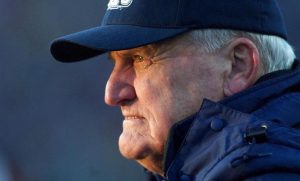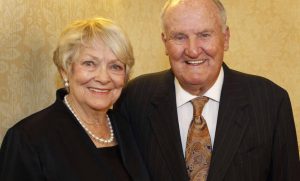In loving memory of LaVell Edwards
One of my favorite memories was the occasion when Gordon B Hinckley recognized Coach Edwards’ numerous accomplishments and announced the naming of the LaVell Edwards Stadium.
How does one begin remembering a person with the character of LaVell Edwards? So much to celebrate. So much to revere. Words seem to fail me at times like these. This isn’t the first time.

LaVell Edwards
Countless pundits, coaches, players, and fans recognized the passing of football coaching great LaVell Edwards. Many wrote words of adoration, respect, love, and admiration for a man that represented more than football. He represented a respectable life, courage, and a legacy we can all enjoy now and for years to come.
As great as his accomplishments were on the football field, his legacy goes much deeper than his defensive line or even his unconventional passing attack. Those who knew him said it best. His legendary coaching career is well-known and touted by others frequently:
- Trever Matich played for LaVell on the 1984 National championship team. He said the real legacy of LaVell Edwards is better husbands, better fathers, and better men.
- Steve Young remembers “The number one quality coach had was to look at you and see potential you didn’t know you have…”
- Patti Edwards “When I married a football player nearly 50 years ago, I had no idea that he would become one of the legendary coaches in the history of college football. What I did know, when I married him, was that he was a gentle soul who loved me. Despite the roller-coaster ride and pressures of football, I have always known that I, along with our children, have come first. In the hustle-bustle world we live in, this knowledge is a great gift that he has given to us.”

LaVell Edwards poses with the LaVell Edwards Stadium.
But the story actually starts long ago. I am a BYU graduate and was privileged to be part of the school football legacy known as the quarterback factory. I witnessed from the outside the miracle happening all about us in those days. Incredibly, it’s already been four years now since I received a letter from BYU Alumni explaining my 25-year reunion was coming up. When did so many years suddenly pass?
I was a member of one of the largest graduation classes and was invited to help organize the upcoming reunion. So where is this going and how does it relate to our beloved coach LaVell Edwards? That’s an easy one. Those that graduated the year I did included many who witnessed the pinnacle of BYU football, and Edwards of course was an integral part of that. So when we thought about a guest of honor, he and Patty were at the top of our list.
But was that even possible? He was an old man in his 80’s by that time. Would he be able to speak to a group of raving fans and families, which he influenced for good and to whom he left a remarkable legacy? The answer was ‘yes,’ and he consented to be our keynote speaker and guest of honor.
There is much written about the man who became the BYU Football Coach Legacy. Articles and videos about LaVell Edwards and his accomplishments flood the Internet. Here are just a few links of interest:
Ruben LaVell Edwards was born October 11, 1930. He is a legacy among football coaches and a favorite of Brigham Young University. With 257 career victories, he ranks as one of the most successful college football coaches of all time. Among his many notable accomplishments, Edwards guided BYU to a national championship in 1984 and coached Heisman Trophy winner Ty Detmer in 1990.

LaVell Edwards had 257 career victories.
Edwards was BYU’s head football coach from 1972 to 2000. His offensive scheme was passing-focused, though he coached in an era when college football offenses were dominated by strong running attacks. LaVell’s quarterbacks threw over 11,000 passes for more than 100,000 yards and 635 touchdowns. He got the idea to switch to a pass oriented team by looking at BYU’s history. The BYU football program had been a dismal failure before Edwards with the notable exception of one conference championship that resulted from the aerial attack of Virgil Carter. This past success encouraged Edwards to open up the BYU offense.
Edwards coached prominent quarterbacks and helped his players be their best. Awards won by his players include a Heisman Trophy, a Doak Walker Award, a Maxwell Award, two Outland Trophies, four Davey O’Brien Awards, seven Sammy Baugh Awards, and 31 All-America citations, including 11 consensus All-Americans. In 1984, he was named National Coach of the Year after BYU finished the season 13–0 and won the National Championship. Edwards retired after the 2000 season with a 257–101–3 record for a .717 winning percentage.
In the 1980 Holiday Bowl, BYU rallied from a 45–25 deficit with only 4 minutes to play to defeat Southern Methodist University (SMU). Trailing 45–39 with seconds to go, Quarterback Jim McMahon, completed a game winning touchdown pass to Clay Brown.
It was 5:30 a.m. when the 38-year-old Bronco Mendenhall, then the second-youngest Division I head football coach in America, stepped into his office on the still-dark second floor of the Student Athlete Building for his first full day on the job. There was nothing on his desk or shelves. “It was a surreal experience. I was wondering, ‘What have I done?’ and, ‘What do I do now?’” he recalls. “I found myself on my knees within minutes.”
Sometime around 8 a.m. a knock interrupted his prayer. At his door stood the patriarch of BYU football, LaVell Edwards (EdD ’78). Edwards set a chair directly in front of Mendenhall’s chair, and the two sat down, knee-to-knee.

LaVell and Patti Edwards
“His first words were ‘You have a tough job.’ Then there was a pause and silence,” says Mendenhall. “It wasn’t very comforting to hear that. But then he just said, ‘But it’s a great job.’ I didn’t know what he meant by either at the time.”
Mendenhall has come to consider Edwards a mentor and an advocate. “It’s nice to have someone who has done the job better than anyone, who clearly understands what it’s like to be a head coach here.” The relationship helped Mendenhall frame what a BYU football team ought to be.
“As I have expressed many times, LaVell had a tremendous impact on me, not only as a player and as a coach but even more importantly as a person,” current BYU coach Kalani Sitake said. “That is LaVell. He had an impact on so many lives, and not just as coach but as a person. So many people – players, coaches, fans, the entire BYU family, coaching colleagues and opponents – will tell you they are a better person because of him, and I’m definitely one of them. We all love LaVell and appreciate the amazing legacy he leaves with each of us.”
Edwards’ teams have passed for 454 miles during his 22-plus seasons, but there is much more to the man who has brought BYU a national championship in 1984, 16 WAC crowns, 18 bowl berths and invitations to play in the prestigious Kickoff (Meadowlands, J.J.) and Pigskin (Anaheim, Calif.) classics.
LaVell and Patti Edwards are known for their lifetime of help on and off the football field. Famed sports columnist Dick Harmon once wrote “For LaVell and Patti Edwards, it’s all about service.” Neither time nor capacity will allow us to articulate all their contributions on and off the football field.

To read more of Walter’s articles, click the picture.
Many of us cheered LaVell on in those days. We were delighted to have LaVell Edwards and his sweet wife Patti with us during this special occasion. It was with great pleasure that we introduced him as our guest of honor and keynote speaker that evening.
Now with his passing and great emotion, we recognize and honor him once again.
Please join me in remembering BYU legacy, Coach LaVell Edwards…
###
About Walter Penning
In 1989, Walter Penning formed a consultancy based in Salt Lake City and empowered his clients by streamlining processes and building a loyal, lifetime customer base with great customer service. His true passion is found in his family. He says the best decision he ever made was to marry his sweetheart and have children. The wonderful family she has given him and her constant love, support, and patience amid life's challenges is his panacea.
Twitter •






